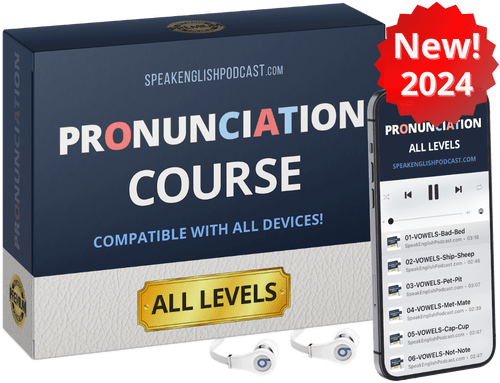300th Episode Celebration
Transcript:
Hello, everyone!
Today is a special day because it’s our seventh year together!!! This week, we have reached 300 episodes and more than 30 million downloads!
Thanks to all of you, we’ve created a huge family of learners from all around the world.
Thank you so much for your support and for sharing the podcast with your friends and family. I appreciate every one of you listening and learning with this podcast and my premium courses.
As we celebrate, I promise to keep bringing you fun and helpful episodes.
More Great News: I will also launch a new premium course!
Let me recommend to you my most listened-to episodes:
#003 – The Importance Of Repeated Listening
In this episode, I explain how many times you have to listen to a material in English.
#018 – Benefits of Listening in English when Exercising
In episode #018, I discuss the importance of exercising and studying English.
#200 – Difficult words to Pronounce in English
In episode #200, I look at some English words very difficult to pronounce.
So, let me know if you enjoyed these recommendations. And tell me your favorite episode (out of all 300.)
Here are some comments from students:
Carlos Silva
Hi, Georgiana, I’m gonna be very honest with you: You are the best teacher IN THE WORLD, I love your teaching method. I have listened to almost all your episodes, and your method is awesome!
Manuel Ruiz
This method is great. I’ve studied English for a long time with many textbooks about grammar, writing, etc., without successful results, but this is the best method for speaking English fluently. I recommend it!!
You can find more comments like these on my website: SpeakEnglishPodcast.com
Now, let’s continue with a special mini-story:
Mini-Story 📖 (Practice your speaking)
I will tell you a story by asking simple questions. I use this method in my premium courses because it’s highly effective.
First, I say a short sentence with facts. Then, I ask you questions. After each question, you answer. Then, I tell you the right answer. That’s how we make the story.
And if you want to improve your fluency much faster, check out my Premium Courses:
SpeakEnglishPodcast.com/courses
You will find several levels.
Okay! Let’s start!
Mary was a young woman who lived in a village by the sea and was eager to learn to speak English fluently.
Who was Mary?
Mary was a young woman eager to learn English.
Was Mary a cat or a woman?
Mary was a woman. She wasn’t a cat.
Was Many young?
Yes. Mary was a young woman.
Did Mary want to learn English?
Yes, she did. She was eager to learn English.
How did Mary want to speak English?
Fluently. Mary wanted to learn to speak English fluently.
What was Mary studying?
English. Mary was studying English.
Did Mary live in a city?
No, no. She didn’t live in a city. She lived in a village.
By the sea or in the mountains?
By the sea. Mary was a young woman who lived in a village by the sea.
Was Mary eager to learn English, or was she unwilling?
No, no. She wasn’t unwilling. Mary was eager to learn English. She had a strong desire to learn English.
Despite her efforts to practice her pronunciation, she struggled with the sounds of the language.
Did Mary find it easy to learn English pronunciation?
No, no. Mary didn’t find it easy. Despite her efforts to practice pronunciation, she struggled with the sounds of the language.
What was Mary’s goal?
Mary’s goal was to learn to speak English. She was eager to speak English fluently.
Was Mary fluent in English?
No, no. Mary wasn’t yet fluent in English. But that was her goal. Her goal was to speak English fluently.
Did Mary struggle?
Yes. She struggled with her pronunciation. Despite her efforts to practice her pronunciation, she had difficulties with the sounds of the language.
One day, Mary was walking in the fields when she saw an old tree with an interesting carving of a woman holding a book.
Was Mary running or walking?
Walking. Mary was walking.
Was she walking on the seashore?
No, no. She was walking in the fields.
Did Mary see anything?
Yes. She saw something. She saw an old tree.
Was Mary old?
No, no. Mary was a young woman.
Who was old?
The tree. The tree Mary saw in the fields was an old one.
Did Mary think the carving was uninteresting?
No, no. Mary didn’t think the carving was uninteresting. She thought it was interesting.
What did the carving represent?
The carving represented a woman.
Did it represent an animal?
No, it did not represent an animal. It represented a woman.
What was the woman holding in her hands? A smartphone?
No, no. The woman wasn’t holding a smartphone. She was holding a book.
Touching the carving, Mary wished to learn English easily. The tree trembled, transporting her to a room with a fireplace and high ceilings where she met Elizabeth Bennet.
Did Mary touch a carving?
Yes, Mary touched a carving.
Was there a reaction from the tree after Mary touched the carving?
Yes, the tree trembled after Mary touched the carving.
Did the tree transport Mary to a different place?
Yes. The tree transported Mary to a room with a fireplace and high ceilings.
Did Mary meet someone in the room she was transported to?
Yes, Mary met Elizabeth Bennet in the room.
Did Mary meet Elizabeth Bennet from Pride and Prejudice?
Yes. Mary met Elizabeth Bennet, a famous novel character from Jane Austen’s book Pride and Prejudice.
Was Elizabeth a real person?
No, no. She wasn’t a real person like Mary. Elizabeth Bennet was a famous book character from the 19th century.
Was there a fireplace in the room?
Yes, there was a fireplace in the room.
Were the ceilings in the room high?
Yes, the ceilings in the room were high.
What did Mary wish for when she touched the carving? Did she wish to meet Elizabeth Bennet?
No. Mary didn’t wish to meet Elizabeth Bennet when she touched the carving. She wished to learn English quickly.
Mary and Elizabeth spent several weeks together, developing a unique method of practicing English.
Did Mary and Elizabeth spend time together?
Yes, Mary and Elizabeth spent several weeks together developing a unique English practice method.
Did they spend years together?
No, no. They spent several weeks together. Not years.
How long did the girls spend developing the method of practicing English?
They spent several weeks developing the method of practicing English.
What did they do for several weeks? Read books?
No, no. They didn’t read books. They developed a unique method of practicing English.
What did the girls develop together? An app?
No, no. They developed a unique method of practicing English together.
Was the method they developed unique?
Yes. The method they developed was unique.
Mary’s pronunciation improved dramatically under Elizabeth’s guidance, and she became grateful for the magical tree and her new friend.
Did Mary’s pronunciation improve a little?
No, no. Mary’s pronunciation didn’t improve a little. It improved dramatically under Elizabeth’s guidance.
Did anyone help Mary with her pronunciation?
Yes, Elizabeth guided Mary.
Was Mary ungrateful?
No, no. Mary wasn’t ungrateful. She was grateful.
Why was Mary grateful? For Elizabeth’s guidance?
Yes, Mary was grateful for her guidance.
Did Mary feel grateful for anything else?
Yes, Mary felt grateful for the magical tree and her new friend.
Has Mary recently found a new friend?
Yes, Mary recently found a new friend in Elizabeth.
Were Mary and Elizabeth enemies?
No. Mary and Elizabeth were not enemies. They were friends.
One day, at sunset, Elizabeth vanished, leaving Mary with a newfound love for the English language.
Did Elizabeth vanish?
Yes, she vanished, she disappeared.
When did Elizabeth vanish? One morning?
No. No. She didn’t vanish one morning. Elizabeth vanished at sunset.
Did Mary develop a newfound love for the English language?
Yes, Mary developed a newfound love for the English language.
Did Elizabeth have any influence on Mary’s newfound love for English?
Yes, Elizabeth influenced Mary’s newfound love for English.
What was Mary’s newfound love? Mr. Darcy?
No, no. Mary’s newfound love was the English language. Not Mr. Darcy. Elizabeth had influenced Mary to fall in love with English, not with Mr. Darcy.
After this adventure, Mary became an English pronunciation teacher, sharing her passion and unique learning techniques with students who struggled with pronunciation.
Did Mary become an English teacher?
Yes, she became an English pronunciation teacher.
What kind of teacher was she? An English grammar teacher?
No, no. Mary didn’t teach grammar. She was an English pronunciation teacher.
When did Mary become an English teacher? Before or after this adventure?
After this adventure. Not before. She became an English pronunciation teacher after this adventure.
Did Mary teach others who struggled with pronunciation?
Yes, Mary taught others who struggled with pronunciation.
Did she use a traditional method?
No, no. She used unique learning techniques.
Did Mary’s students find her teaching techniques effective?
Yes. They found her techniques effective.
Did Mary still struggle with English pronunciation?
No, no. Mary didn’t struggle with her English pronunciation anymore.
Did Mary teach only pronunciation?
Only pronunciation. Mary only taught English pronunciation.
Did you improve your English fluency with Georgiana’s method?
Yes. I improved my English fluency with Georgiana’s method.
Once again, thank you so much for your support and for sharing the podcast with your friends and family.
And if you want to improve your fluency much faster, check out my Premium Courses:
SpeakEnglishPodcast.com/courses
You will find several levels.




0 Comments